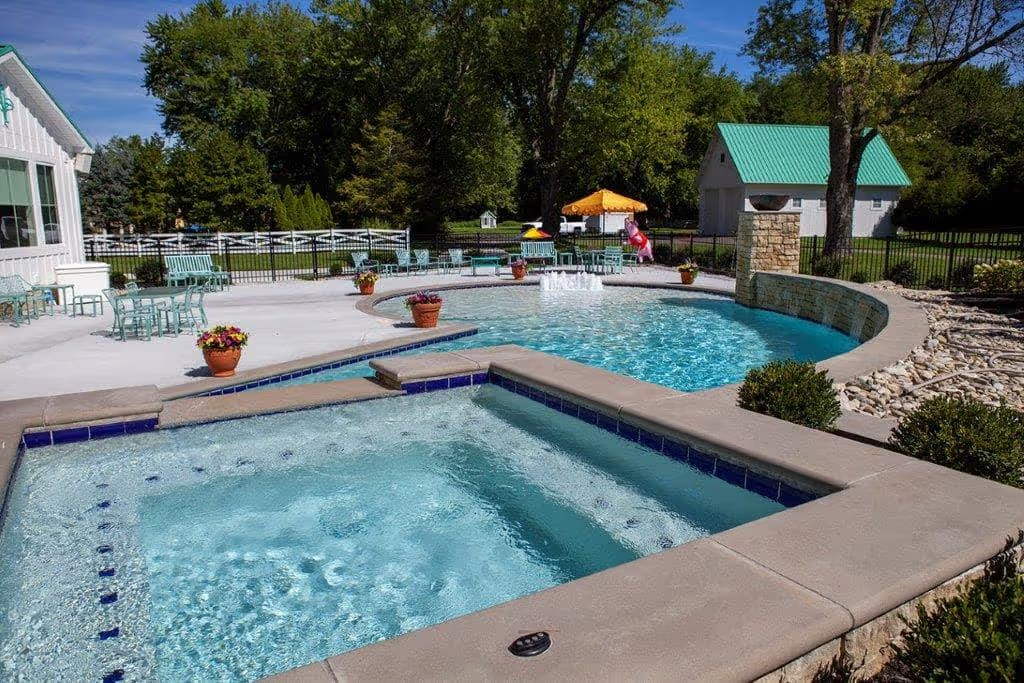- Stone Center
- Blog
Outcropping Retaining Wall: Timeless Beauty and Strength
24/10/2024
6/13/2024
Outcropping Retaining Wall: Timeless Beauty and Strength
.jpg)
Retaining walls, essential for managing slopes and preventing erosion, come in various forms, each with its unique strengths and weaknesses. One type is outcropping retaining walls that are built using natural stone. They stand out for their inherent beauty and robust functionality. These walls, sometimes called outcropping stone retaining walls, harness the natural appeal of stone, creating structures that are both visually stunning and remarkably durable.
This article by our seasoned experts at Stone Center will delve into the captivating world of outcropping retaining walls, exploring their construction, advantages, disadvantages, and the factors to consider when choosing this style for your project.
What Is an Outcropping Retaining Wall?
An outcropping retaining wall, simply put, is a retaining wall constructed using naturally occurring stones sourced directly from the earth. Unlike manufactured concrete blocks, these stones boast unique shapes, sizes, and textures that create a visually captivating outcropping wall that blends seamlessly with the natural landscape.
Outcropping itself refers to the exposed bedrock that emerges from the earth's surface. Utilizing these stones for retaining walls not only delivers structural integrity but also infuses a project with a raw, natural aesthetic that manufactured materials struggle to replicate.
Pros and Cons of Natural Stone Outcropping Retaining Walls
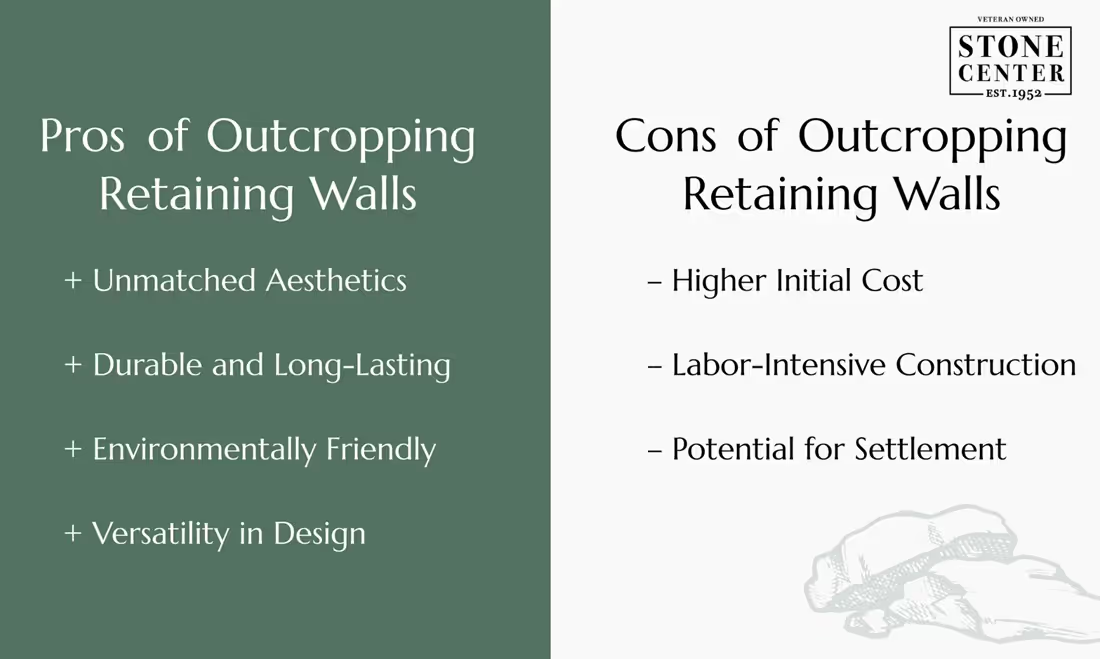
Before you commit to an outcropping retaining wall, be sure to weigh the pros and cons to determine if this style aligns with your priorities and project requirements.
Pros of Outcropping Retaining Walls
- Unmatched Aesthetics: Outcropping retaining walls, crafted with natural stone, have an inherent beauty that manufactured materials can't replicate. They blend seamlessly with the surrounding landscape, adding a touch of rustic charm and elegance to any property.
- Durable and Long-Lasting: Natural stone, known for its strength and resilience, ensures the longevity of these walls. Properly constructed outcropping walls can withstand significant pressure and the test of time, providing lasting value.
- Environmentally Friendly: Utilizing natural stone minimizes the environmental impact compared to manufacturing concrete blocks. Additionally, the porous nature of stone allows for natural drainage, reducing runoff and promoting a healthy ecosystem.
- Versatility in Design: The unique shapes and sizes of natural stones provide immense flexibility in design, allowing for the creation of curved walls, tiered structures, and other creative configurations.
Cons of Outcropping Retaining Walls
- Higher Initial Cost: Compared to manufactured materials, the initial price tag of natural stones is higher. Sourcing, transporting, and handling large stones contributes to the increased cost.
- Labor-Intensive Construction: Building an outcropping retaining wall demands skilled labor and specialized expertise, which can mean higher construction costs. The meticulous process of selecting, fitting, and securing each stone requires time and patience.
- Potential for Settlement: Due to the irregular shapes of natural stones, there's a possibility of minor settlement over time. This requires regular monitoring and occasional adjustments to maintain the wall's integrity.
Ultimately, the decision of whether to choose an outcropping retaining wall boils down to your priorities and project requirements. If unmatched beauty, longevity, and environmental friendliness are paramount, then the advantages of outcropping walls often outweigh the potential drawbacks.
4 Factors to Consider When Choosing Outcropping Retaining Walls
Deciding to invest in an outcropping retaining wall involves careful consideration of several factors that can significantly impact the project's success. Here are four key aspects to evaluate before making your decision:
#1. Project Scale and Complexity
For smaller projects or simple retaining needs, manufactured blocks might be a more cost-effective option. However, for larger, more complex projects where aesthetics and longevity are paramount, outcropping retaining walls offer a better solution.
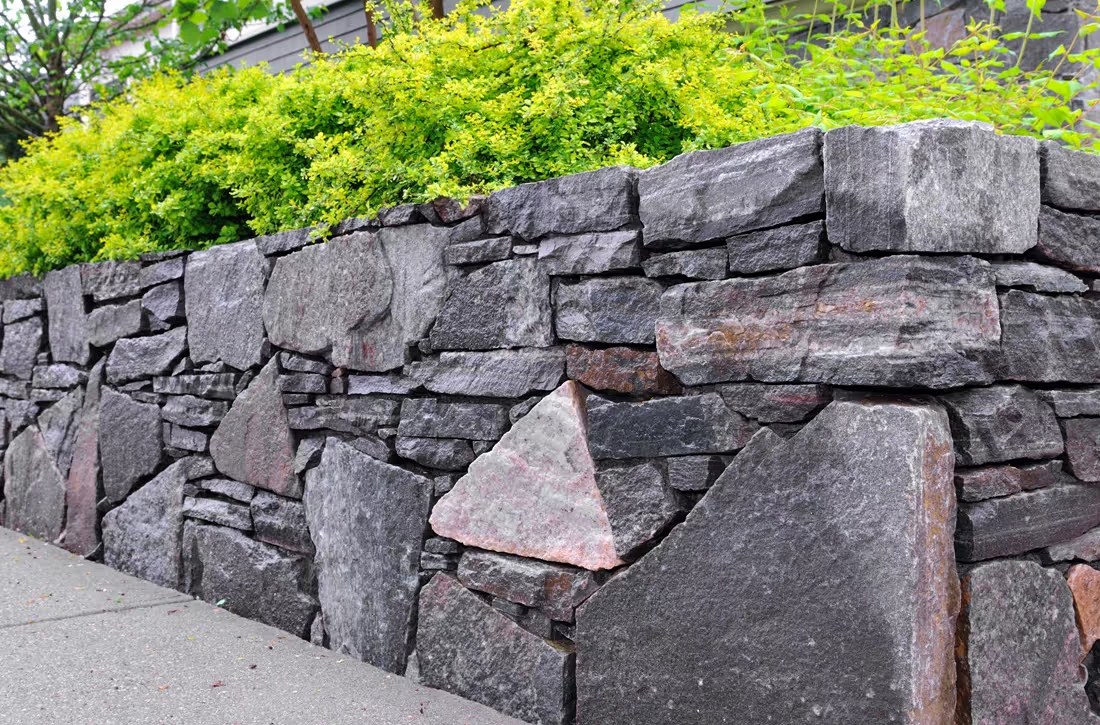
#2. Budget and Timeline
The higher initial cost and labor-intensive nature of outcropping walls require careful budget considerations. Plus, the construction timeline for these walls can be longer compared to projects using manufactured blocks.
#3. Aesthetic Preferences and Site Integration
If achieving a natural, integrated look is a priority, then outcropping walls are an ideal choice. The unique character of each stone contributes to a visually captivating structure that blends seamlessly with the surrounding environment.
#4. Soil Conditions and Drainage
Understanding the site's soil composition and drainage characteristics is essential for the wall's long-term stability. Proper drainage behind the wall alleviates pressure and prevents soil erosion.
Carefully consider these factors to make a well-informed decision about whether outcropping retaining walls align with your project's specific needs and priorities. Remember, consulting with experienced professionals can provide valuable insights and guidance to guarantee an outcome that is successful and visually stunning.
Choosing the Right Retaining Wall for Your Project at Stone Center
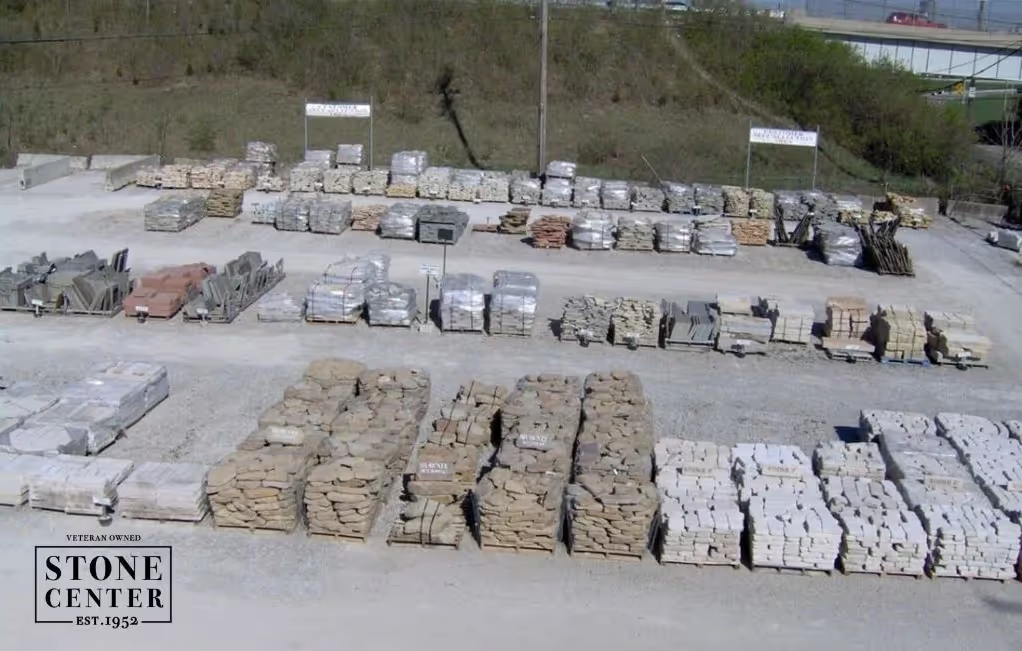
Selecting the ideal retaining wall involves careful consideration of factors such as budget, project scale, desired aesthetics, and site-specific conditions. Stone Center boasts a diverse selection of natural stone products, sourced and crafted with the highest standards to ensure both beauty and durability. Whether you're seeking a classic, rustic, or modern aesthetic, you'll find the perfect stone to bring your vision to life.
Here are just a few examples of the stunning outcropping stones available at Stone Center:
SC Gray Outcropping
This elegant gray stone offers a timeless appeal, blending seamlessly with various landscape styles. SC Gray Outcropping’s versatile color palette and naturally weathered texture create a sense of sophistication and understated charm.
Rustic Beige Outcropping
For a warmer, more inviting aesthetic, Rustic Beige Outcropping is an excellent choice. Its earthy tones and rugged textures are naturally beautiful and rustic, blending effortlessly with surrounding landscapes.
Weathered Limestone Ledge
This classic stone brings a touch of timeless elegance to any project. Weathered Limestone Ledge's naturally weathered surface, with subtle variations in color and texture, creates a sense of history and enduring beauty.
Derbyshire
This distinctive stone stands out with its bold, multi-tonal character. Derbyshire’s blend of browns, grays, and tans creates a visually captivating texture that adds depth and richness to any retaining wall.
SC Gray Thin
For projects needing a sleek and modern aesthetic, SC Gray Thin provides a contemporary solution. Its thin profile and consistent gray tones offer a minimalist yet sophisticated appeal, perfect for creating clean lines and minimalist designs.
Construction of Outcropping Retaining Walls: Step-by-Step Guide
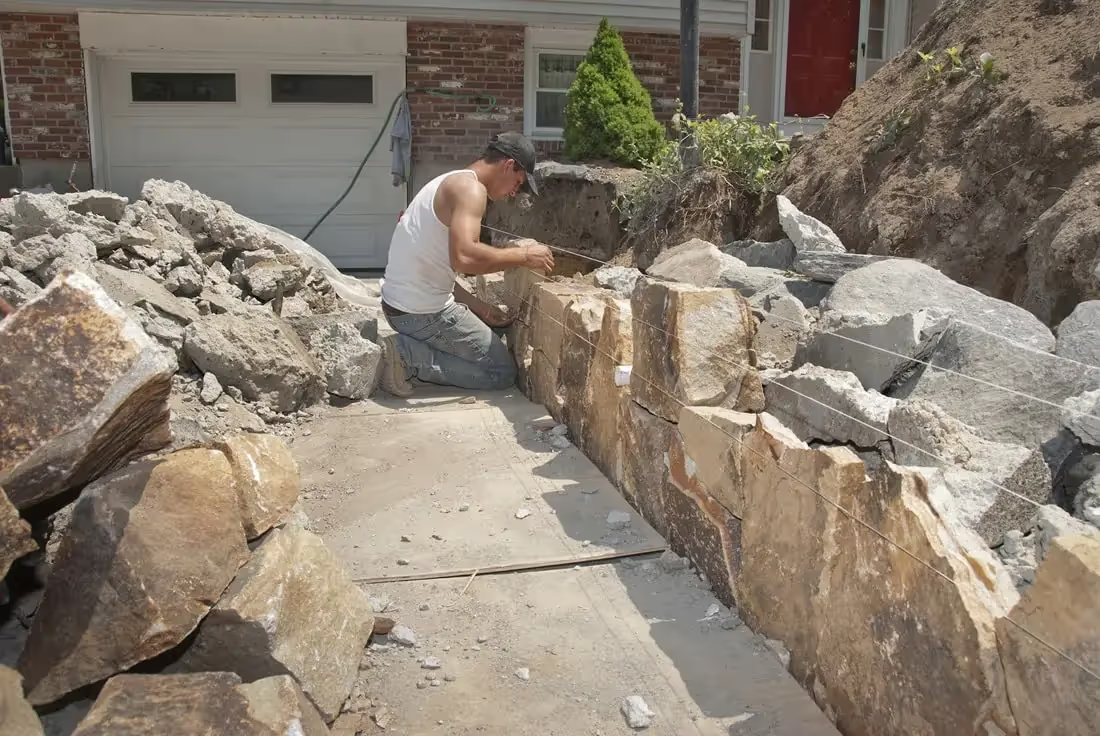
Building a stone retaining wall is a meticulous process that requires skilled craftsmanship and a keen understanding of stonework.
Here's a step-by-step breakdown of the construction process:
#1. Excavation and Foundation
The first step involves excavating the area where the wall will be situated. This includes digging a trench deep enough to accommodate the wall's foundation, which is essential for stability. The foundation is typically made of compacted gravel or crushed stone to provide a solid base.
#2. Stone Selection and Placement
Selecting the right stones is key for both aesthetics and structural integrity. The stones should be large enough to provide sufficient weight and interlocking capability. Skilled masons carefully arrange and fit the stones, utilizing their natural shapes to create a stable, interlocking structure.
#3. Backfill and Drainage
The area behind the wall is backfilled with granular material, such as gravel or crushed stone, to facilitate drainage and alleviate pressure on the wall. Geotextile fabric may be incorporated to prevent soil erosion and maintain the backfill’s integrity.
#4. Coping and Finishing Touches
The top of the wall, known as the coping, plays an important role in both aesthetics and functionality. It’s often finished with larger, flat stones, carefully selected for their size and shape, to create a visually appealing cap and provide a level surface.
Outcropping Retaining Walls: Invest in Timeless Beauty with Stone Center!
Outcropping retaining walls are more than just functional structures — they are testaments to the enduring beauty and strength of nature. Crafted from stones that have witnessed the passage of time, these walls are unique in a way that man-made materials struggle to replicate.
When you want to create something truly remarkable, Stone Center is here to help you every step of the way! We have the expertise, the resources, and the unwavering passion to help you transform your vision into a reality. Get in touch with our professionals and let us help you create an outcropping retaining wall that will stand as a testament to your commitment to lasting beauty and lasting quality.
FAQ
.avif)
Jon, the owner of Stone Center, is a knowledgeable expert in natural stone products, specializing in various types of stone for landscaping and architectural projects. Passionate about promoting the beauty and versatility of natural stone, Jon aims to use these blogs to inspire readers with creative ideas to upgrade their homes.
How much does it cost to get a stone restored?
How much you end up spending to restore stone varies on the type of stone, the technique, and the stone’s current condition. Stone in good condition will cost less to restore, whereas stone that has a lot of wear and tear may require a longer restoration.




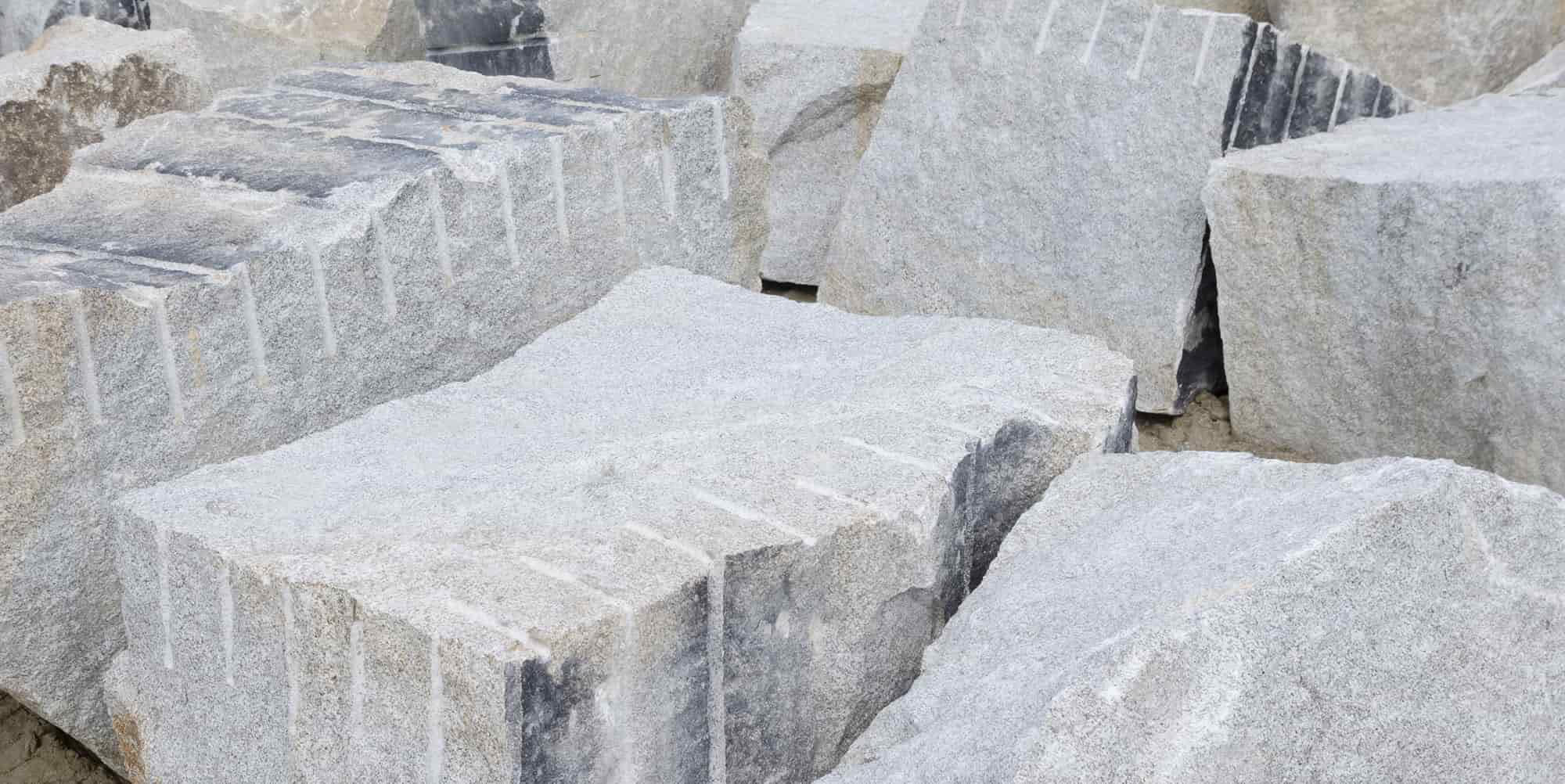
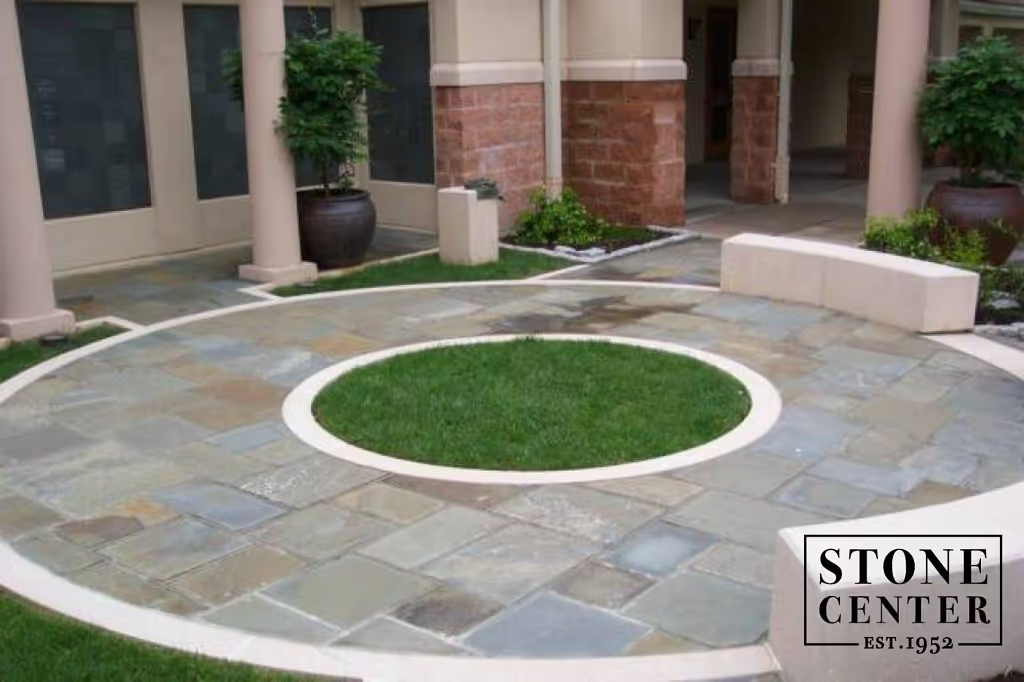
.avif)
